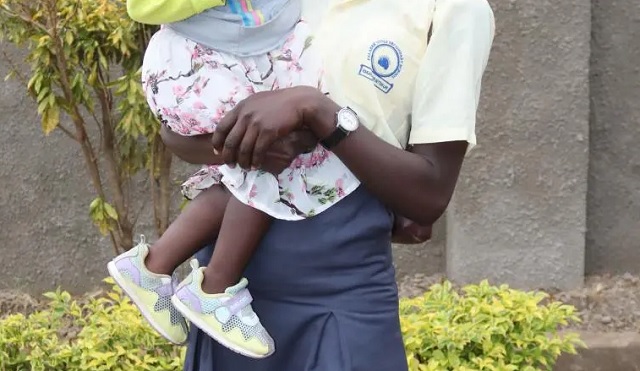
Kitgum, Uganda | THE INDEPENDENT | Jessica Avol 19, counts herself lucky among teenage mothers to be back at school, thanks to talk therapy sessions that saw her fighting depression and stigma.
In 2019, Avol who was 17 years dropped out of school while in senior two at Kitgum Standard Secondary in Kitgum Municipality school due to school fees challenges. The teenager at the time was being supported singlehandedly by her mother who is the family’s breadwinner.
Weeks after dropping out of school, one of her sisters picked Avol up and took her to Kampala where she would be helping her with house chores.
While all seemed well at first, Avol says repeated abuse against her sister by the husband left her uncomfortable, prompting her to relocate to her sister’s friend.
But at the home of her sister’s friend, Avol experienced more discomfort as her friend would bring different men to sleep with.
The teenage mother says she decided to opt for a shortcut in life by entering into a relationship with a man who had promised to transform her life in the suburbs of Kibuli in Kampala.
Avol says she later conceived in their short relationship but her fiancé opted to push her out of their Kampala home to their village in Palabek Sub-County In Lamwo district over unclear reasons.
According to Avol, after she delivered, the husband she thought would protect her started battering her and would occasionally deny her the basics for taking care of their child, something that forced her to return to her mother in Lamwo District.
In 2020, Avol returned home to her mother’s village in Palabek Ogili Sub-county with her baby girl after encountering countless domestic violence by her husband.
She would later return to school to continue with her studies at Palabek Ogili Secondary School in her senior two.
However, strings of stigma and isolation from students and community members due to being a teenage mother sent her into depression and occasional thoughts of dropping out of school again.
Avol however got lucky to receive counseling and talk therapy sessions that helped her to gain confidence and reverse her decision on dropping out of school, thanks to the intervention of Strong Minds Uganda, an organization offering group talk therapy to women and adolescents with depression.
The 19-year-old mother, now in Senior Four says she would love to become a Laboratory technician, once she completes her studies.
Vincent Mujuni, the Head of Programmes at Strong Minds Uganda says the organization’s group interpersonal psychotherapy model is helping to address cases of depression among both women and adolescent girls.
Currently, according to Mujuni, the organization is working in 16 schools within Gulu City where they opened their new offices last week, and nine schools in Lamwo District where they identified students suffering from depression.
Mujuni says the triggers of depression arise from many factors and highlights severe life changes among individuals as one of the biggest contributors.
Alfred Can-Ogura, a Teacher Facilitator trained by Strong Minds Uganda acknowledges that depression cases among learners in schools are fast rising owing to challenges being faced mostly at their homes and in society.
He notes that the common contributors include domestic violence among spouses, drug abuse, and teenage pregnancy.
Alfred Droti, a Senior Psychiatric Clinical Officer at Gulu Regional Referral Hospital in an earlier interview attributed the rising cases of mental illnesses in the Acholi Sub-region to depression.
According to Droti, although depression affects all gender, the most vulnerable are females.
Gulu Regional Referral Hospital Mental Health Unit statistics show that the facility between January and October last year registered 54 percent admission of males between the age of 20 to 50 years and 46 percent of females between 18-45 years suffering from mental illness.
According to the World Health Organization (WHO) report of 2021, depression is estimated to occur among 1.1 percent of adolescents aged 10-14 years, and 2.8 percent of 15-19-year-olds.
*****
URN
 The Independent Uganda: You get the Truth we Pay the Price
The Independent Uganda: You get the Truth we Pay the Price



I can, if I choose teach a stigma.
I can, if I choose not do so.
I need only be aware I can choose.
Harold A Maio